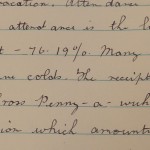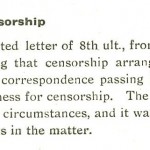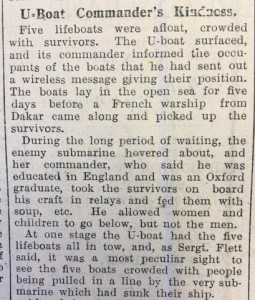This week the final Soviet assault on German positions in the city of Stalingrad continued while on 13 January another Soviet offensive targeted Hungarian and Italian forces on the German flank along the River Don, destroying them or driving them back. In North Africa the British began an attack on Tripoli and on 14 January Winston Churchill and President Roosevelt met at Casablanca: priority was given to tackling U-boats and a policy of unconditional surrender towards the Axis powers was agreed.
 Winter colds were taking their toll in Caithness schools. The Head Teacher of Thrumster School noted in the log book on 15 January: “This week the attendance is the lowest it has been since August – 76.19%. Many of the children are sick and have colds. The receipt has been received for the Red Cross Penny-a-week fund for last term’s collection which amounted to £1-19-7½.”
Winter colds were taking their toll in Caithness schools. The Head Teacher of Thrumster School noted in the log book on 15 January: “This week the attendance is the lowest it has been since August – 76.19%. Many of the children are sick and have colds. The receipt has been received for the Red Cross Penny-a-week fund for last term’s collection which amounted to £1-19-7½.”
The John O’Groat Journal printed a letter this week from “A Shopkeeper” in Wick, raising  the ongoing issue of rats in the town: “…what is being done to destroy the swarms of rats that are causing so much destruction all over the town? In some parts the rats are so numerous that ordinary means do not seem sufficient to reduce their numbers appreciably… It is time that something should be done by our local authorities to deal more effectively with this menace in our midst.”
the ongoing issue of rats in the town: “…what is being done to destroy the swarms of rats that are causing so much destruction all over the town? In some parts the rats are so numerous that ordinary means do not seem sufficient to reduce their numbers appreciably… It is time that something should be done by our local authorities to deal more effectively with this menace in our midst.”
 Wick Burgh Council meanwhile had other matters on its mind. The continuing row over the censorship of Caithness mail had finally been resolved. Sir Archibald Sinclair had written to the Council to say that “censorship arrangements had now been so arranged that that internal correspondence passing in Caithness will no longer be sent south to Inverness for censorship. The position was noted as satisfactory.”
Wick Burgh Council meanwhile had other matters on its mind. The continuing row over the censorship of Caithness mail had finally been resolved. Sir Archibald Sinclair had written to the Council to say that “censorship arrangements had now been so arranged that that internal correspondence passing in Caithness will no longer be sent south to Inverness for censorship. The position was noted as satisfactory.”
Finally this week, just when the leaders of Britain and America had agreed to tackle the U-boat menace, the John O’Groat Journal reported a story of remarkable humanity by a U-boat commander in the Mediterranean. Sergeant-Observer George Flett of Wick had already had the bad luck of having his plane crash into the sea in the Middle East. He was on his way back to Britain when the ship he was on was torpedoed by a U-boat and sunk. The crew and passengers crowded onto lifeboats as the ship went down.
Sergeant Flett recounted the events that followed. The U-boat surfaced, “and its commander informed the occupants of the boats that he had sent out a wireless message giving their position.” In the five days that followed the U-boat stayed with the lifeboats and “took the survivors on board his craft in relays and fed them with soup, etc. He allowed women and children to go below, but not the men. At one stage the U-boat had the five lifeboats all in tow.” It turned out that the U-boat’s commander “said he was educated in England and was an Oxford graduate.”
